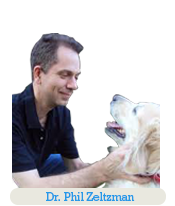
Dr. Phil Zeltzman is a mobile, board-certified surgeon in Allentown, PA. Find him online at www.DrPhilZeltzman.com. He is the co-author of “Walk a Hound, Lose a Pound” (www.WalkaHound.com).
Dear reader, how would you describe your vet? Is (s)he good? excellent? Or awesome?
Let me share with you my top secret to judge how good a family vet is. To clarify, I am a surgeon. Family vets refer difficult surgery patients to me. So I have a somewhat unusual "system" to rate my beloved colleagues.
Cinnamon, a gorgeous 6-year old Golden retriever, had a "hot spot." His owner took him to his family vet, Dr. C. A hot spot is an area in the skin that a dog licks so feverishly, that it becomes hairless, raw, red, irritated and painful. It is so annoying that the poor dog becomes obsessed with the hot spot. Licking and chewing only make things worse.
But back to Cinnamon. Instead of simply sending him home with a prescription for cortisone cream and maybe antibiotics, Dr. C went on to perform a complete physical exam. There was nothing else to report... except for a small mass in the thyroid area. She doubled checked, but there was little doubt in her mind: Cinnamon most likely had a thyroid tumor.
She kindly referred the patient to me. We performed surgery to remove the mass... which the lab diagnosed as cancer. Clearly the hot spot was the least of his problems. But because his family vet found it so early, Cinnamon should logically do better than if the tumor had been found after growing for several weeks or even several months.
But because his family vet found it so early, Cinnamon should logically do better than if the tumor had been found after growing for several weeks or even several months.
Thunder, an 8 year old German shepherd, was due for her "shots." To many pet owners and some vets, this may seem like a routine, boring, necessary evil... Once a year, the pet is schlepped to the vet. Pet hates car ride. Vet gives shots. Pet hates vet. Owner hates paying the bill. Nobody seems very happy here.
But Thunder's family vet, Dr. T, does not see the situation like that at all. He educates all of his clients so that they understand that the yearly vaccines are important, but the yearly physical is even more important.
Which is why Dr. T performs a thorough physical exam and comments on his findings out loud. "Wow, nice teeth. Looks like you're doing a great job brushing Thunder's teeth." "The left ear is a little bit red, we will check to see if there is an infection in there." And so on and so forth. Organ by organ.
Only after a full physical does Dr. T give the vaccines.
But that day, the conscientious Doctor felt that Thunder's spleen was irregular. He focused on the area, and became convinced that the spleen had a mass. He referred Thunder to me for surgery. Fortunately, the spleen is a somewhat expendable organ, so it was removed. It was then sent to the lab for analysis.
Masses in the spleen have about a 50-50 chance of being cancerous.
But fortunately for Thunder, the mass was benign! Regardless, had it been left undetected, it would most likely have grown, causing anemia (a low red blood cell count) and possibly could have ruptured, causing internal bleeding.
Dr. T's dedication and thoroughness avoided such complications, and Thunder's owner should be very grateful for that.
These stories are not unusual in my world. Some of my colleagues have found tumors in an anal gland ONLY because they performed a "routine" rectal exam; or a mass way in the back of the mouth, simply because they looked; or a mass deep down at the bottom of the ear canal, simply because they took the time to check.
Now please understand that I am not saying that a good vet is one who finds a tumor every time you walk into the clinic!
In my mind, the two family vets above are modern heroes. Instead of rushing through a "routine" exam for a minor issue, they performed a thorough physical exam, from the tip of the nose to the tip of the tail.
This, in my mind, is the mark of awesome vets. They don't jump to conclusions. They don't just do the obvious and wave goodbye. They don't simply focus on the tip of the iceberg. They don't believe in the 2-minute veterinary consult.
Awesome vets perform a full exam, write their findings, and share them with you, the dedicated pet parent.
Keep that in mind during your next visit to the vet.
Note: names have been changed to protect the patients' privacy, but the stories are real.
If you have any questions or concerns, you should always visit or call your veterinarian – they are your best resource to ensure the health and well-being of your pets.
